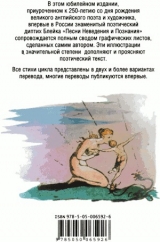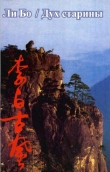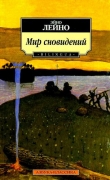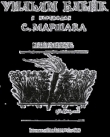Стихотворения

Текст книги "Стихотворения"
Автор книги: Уильям Блейк
Соавторы: Алексей Зверев,William Blake
Жанр:
Поэзия
сообщить о нарушении
Текущая страница: 8 (всего у книги 13 страниц)
«Some people admire the work of a fool...»
Some people admire the work of a fool,
For it's sure to keep your judgement cool;
It does not reproach you with want of wit;
It is not like a lawyer serving a writ.
«Since all the riches of this world...»«Творенье дурака по вкусу многим людям...»
Перевод В. Потаповой
Творенье дурака по вкусу многим людям.
О нем наверняка мы без волненья судим.
Нас в тупости оно не упрекнет; в отместку,
Как стряпчий, – не пришлет судебную повестку.
«Since all the riches of this world...»
Since all the riches of this world
May be gifts from the Devil and earthly kings,
I should suspect that I worshipp'd the Devil
If I thank'd my God for worldly things.
«I rose up at the dawn of day...»О благодарности.
Перевод С. Маршака
От дьявола и от царей земных
Мы получаем знатность и богатство.
И небеса благодарить за них,
По моему сужденью, – святотатство.
«I rose up at the dawn of day...»
I rose up at the dawn of day—
'Get thee away! get thee away!
Pray'st thou for riches? Away! away!
This is the Throne of Mammon grey.'
Said I: This, sure, is very odd;
I took it to be the Throne of God.
For everything besides I have:
It is only for riches that I can crave.
I have mental joy, and mental health,
And mental friends, and mental wealth;
I've a wife I love, and that loves me;
I've all but riches bodily.
I am in God's presence night and day,
And He never turns His face away;
The accuser of sins by my side doth stand,
And he holds my money-bag in his hand.
For my worldly things God makes him pay,
And he'd pay for more if to him I would pray;
And so you may do the worst you can do;
Be assur'd, Mr. Devil, I won't pray to you.
Then if for riches I must not pray,
God knows, I little of prayers need say;
So, as a church is known by its steeple,
If I pray it must be for other people.
He says, if I do not worship him for a God,
I shall eat coarser food, and go worse shod;
So, as I don't value such things as these,
You must do, Mr. Devil, just as God please.
«Я встал, когда редела ночь...»
Перевод С. Маршака
Я встал, когда редела ночь.
– Поди ты-прочь! Поди ты прочь!
О чем ты молишься, поклоны
Кладя пред капищем Мамоны?
Я был немало удивлен —
Я думал, – это Божий трон.
Всего хватает мне, но мало
В кармане звонкого металла.
Есть у меня богатство дум,
Восторги духа, здравый ум,
Жена любимая со мною.
Но беден я казной земною.
Я перед Богом день и ночь.
С меня Он глаз не сводит прочь.
Но дьявол тоже неотлучен:
Мой кошелек ему поручен.
Он мой невольный казначей.
Я ел бы пищу богачей,
Когда бы стал ему молиться.
Я не хочу, а дьявол злится.
Итак, не быть мне богачом.
К чему ж молиться и о чем?
Желаний у меня немного,
И за других молю я Бога.
Пускай дает мне злобный черт
Одежды, пищи худший сорт, —
Мне и в нужде живется славно..
И все же, черт, служи исправно!
The Pickering Manuscript
Манускрипт Пикеринга
1800-1803
The Smile
The Smile
There is a smile of love,
And there is a smile of deceit,
And there is a smile of smiles
In which these two smiles meet.
And there is a frown of hate,
And there is a frown of disdain,
And there is a frown of frowns
Which you strive to forget in vain,
For it sticks in the heart's deep core
And it sticks in the deep backbone—
And no smile that ever was smil'd,
But only one smile alone,
That betwixt the cradle and grave
It only once smil'd can be;
And, when it once is smil'd,
There's an end to all misery.
Улыбка.
Перевод А. Парина
Есть Улыбка Любви,
Есть Улыбка притворной Личины,
Есть Улыбка Улыбок —
В ней обе Улыбки едины.
Есть Ухмылка Вражды,
Есть Ухмылка Презренья,
Есть Ухмылка Ухмылок,
От которой не знают забвенья,
Ибо в струпьях душа от нее
И нутро в несчислимых увечьях;
Но единой Великой Улыбке
Суждено на устах человечьих
Единожды вспыхнуть в пути
От Колыбели до Гроба;
Но достаточно ей расцвести —
И впадает в ничтожество Злоба.
The Golden Net
The Golden Net
Three Virgins at the break of day:—
'Whither, young man, whither away?
Alas for woe! alas for woe!'
They cry, and tears for ever flow.
The one was cloth'd in flames of fire,
The other cloth'd in iron wire,
The other cloth'd in tears and sighs
Dazzling bright before my eyes.
They bore a Net of golden twine
To hang upon the branches fine.
Pitying I wept to see the woe
That Love and Beauty undergo,
To be consum'd in burning fires
And in ungratified desires,
And in tears cloth'd night and day
Melted all my soul away.
When they saw my tears, a smile
That did Heaven itself beguile,
Bore the Golden Net aloft,
As on downy pinions soft,
Over the Morning of my day.
Underneath the net I stray,
Now entreating Burning Fire
Now entreating Iron Wire,
Now entreating Tears and Sighs—
O! when will the morning rise?
Златая сеть.
Перевод В. Потаповой
Три девы в предрассветный час:
«Куда ты, юноша, от нас?
О горе, горе!» Из очей
У каждой хлынул слез ручей.
Одна – огнем одела стан,
Другой – наряд железный дан.
На третьей – полное сиянья,
Из слез и вздохов одеянье.
И сеть из пряжи золотой
Несут, рыдая, в лес густой.
Заплакав с ними, я узрел
Любви и Красоты удел:
Они двойным огнем палимы.
Желанья их неутолимы.
До слез я жаждал им помочь, —
Одетым в слезы день и ночь.
Тут вызвал я у них улыбку,
Что небеса ввела б в ошибку, —
Улыбку, что златую сеть
Заставила, как пух, взлететь
И захлестнуть начало дней
Моих, чтоб я блуждал под ней.
Взываю к Ярому Огню,
Молю Железную Броню,
Слезам и Вздохам говорю:
– Когда увижу я зарю?
The Mental Traveller
The Mental Traveller
I travell'd thro' a land of men,
A land of men and women too;
And heard and saw such dreadful things
As cold earth-wanderers never knew.
For there the Babe is born in joy
That was begotten in dire woe;
Just as we reap in joy the fruit
Which we in bitter tears did sow.
And if the Babe is born a boy
He's given to a Woman Old,
Who nails him down upon a rock,
Catches his shrieks in cups of gold.
She binds iron thorns around his head,
She pierces both his hands and feet,
She cuts his heart out at his side,
To make it feel both cold and heat.
Her fingers number every nerve,
Just as a miser counts his gold;
She lives upon his shrieks and cries,
And she grows young as he grows old.
Till he becomes a bleeding Youth,
And she becomes a Virgin bright;
Then he rends up his manacles,
And binds her down for his delight.
He plants himself in all her nerves,
Just as a husbandman his mould;
And she becomes his dwelling-place
And garden fruitful seventyfold.
An aged Shadow, soon he fades,
Wandering round an earthly cot,
Full filled all with gems and gold
Which he by industry had got.
And these are the gems of the human soul,
The rabies and pearls of a love-sick eye,
The countless gold of the aching heart,
The martyr's groan and the lover's sigh.
They are his meat, they are his drink;
He feeds the beggar and the poor
And the wayfaring traveller:
For ever open is his door.
His grief is their eternal joy;
They make the roofs and walls to ring;
Till from the fire on the hearth
A little Female Babe does spring.
And she is all of solid fire
And gems and gold, that none his hand
Dares stretch to touch her baby form,
Or wrap her in his swaddling-band.
But she comes to the man she loves,
If young or old, or rich or poor;
They soon drive out the Aged Host,
A beggar at another's door.
He wanders weeping far away,
Until some other take him in;
Oft blind and age-bent, sore distrest,
Until he can a Maiden win.
And to allay his freezing age,
The poor man takes her in his arms;
The cottage fades before his sight,
The garden and its lovely charms.
The guests are scatter'd thro' the land,
For the eye altering alters all;
The senses roll themselves in fear,
And the flat earth becomes a ball;
The stars, sun, moon, all shrink away,
A desert vast without a bound,
And nothing left to eat or drink,
And a dark desert all around.
The honey of her infant lips,
The bread and wine of her sweet smile,
The wild game of her roving eye,
Does him to infancy beguile;
For as he eats and drinks he grows
Younger and younger every day;
And on the desert wild they both
Wander in terror and dismay.
Like the wild stag she flees away,
Her fear plants many a thicket wild;
While he pursues her night and day,
By various arts of love beguil'd;
By various arts of love and hate,
Till the wide desert planted o'er
With labyrinths of wayward love,
Where roam the lion, wolf, and boar.
Till he becomes a wayward Babe,
And she a weeping Woman Old.
Then many a lover wanders here;
The sun and stars are nearer roll'd;
The trees bring forth sweet ecstasy
To all who in the desert roam;
Till many a city there is built,
And many a pleasant shepherd's home.
But when they find the Frowning Babe,
Terror strikes thro' the region wide:
They cry 'The Babe! the Babe is born!'
And flee away on every side.
For who dare touch the Frowning Form,
His arm is wither'd to its root;
Lions, boars, wolves, all howling flee,
And every tree does shed its fruit.
And none can touch that Frowning Form,
Except it be a Woman Old;
She nails him down upon the rock,
And all is done as i have told.
Странствие.
Перевод В. Топорова
Я странствовал в Стране Людей,
Я был в Стране Мужей и Жен —
И лютый страх застыл в глазах,
В ушах остался с тех времен.
Там тяжкий труд – Зачать Дитя,
Забава Праздная – Рожать;
Так нам легко сбирать плоды,
Но тяжко сеять и сажать.
Дитя же, если это Сын,
Старухе Дряхлой отдают,
И та, распяв его гвоздем,
Сбирает крик в златой сосуд.
Язвит терновником Чело,
Пронзает Ногу и Ладонь,
И Сердце, грудь ему разъяв,
Кидает в прорубь и в огонь.
«Тут больно? – ищет. – Тут? а тут?»
В находке каждой – торжество.
Растет он в муках, а она
Лишь молодеет оттого.
И вот он – строен и кровав.
И Дева с ужасом в глазах.
И, путы сбросив, он ее
Берет – всю в путах и в слезах.
«Тут больно? – ищет. – Тут? а тут?»
Ведет, как плугом, борозду;
Он обитает в ней теперь,
Как в нескончаемом саду.
Но вянет вскорости и он,
В своем жилище, как слепой,
Крадясь меж Блещущих Богатств,
Что захватил за День Земной.
Его богатства – жемчуг слез,
Рубины воспаленных глаз,
И злато раскаленных дум,
И страсть, и просьба, и приказ.
Он – это ел, он – это пил;
Теперь он кормит и поит
И перехожих, и больных —
Отныне дом его открыт.
К нему приходят – поглазеть,
Он стал посмешищем для всех;
Младенец-Дева из огня
Должна восстать, чтоб смолкнул смех.
И восстает из очага —
Златая, огненная стать, —
Не подымается рука
Дотронуться и спеленать.
А Дева ищет не его —
Богат иль беден, юн иль стар
Ее избранник, – но ему
Дом старца преподносит в дар.
Ограбленный, уходит вон.
Ища странноприимный дом,
Где выйдет Дева из огня
И слюбится со стариком.
Седой, согбенный и слепой,
Берет он Огненную Дщерь —
И вот рассыпался дворец.
И сад осыпался теперь.
Все перехожие – бежать,
Дрожа в смятенье, как листва,
И шаром дшоская Земля
Крутится в вихре естества.
Шарахаются звезды прочь,
Забившись в щели пустоты,
Не стало пищи и питья,
Одни пустыни столь пусты.
Но есть Невинные Уста,
Они – Вино, и Хлеб, и Мед;
Есть Птицы Глаз на вертелах —
И, воскресая, ест и пьет.
Он знает, что растет назад,
Растет в младенческие дни;
В пустыне страха и стыда
Вдвоем скитаются они.
Она, как лань, несется прочь —
И, где промчалась, вырос лес,
Ее смятеньем порожден;
А он – за ней, во тьму древес,
Во тьму древес, во тьму Любви
И Ненависти, – он за ней;
И все извилистей леса,
Непроходимей и темней.
И вся пустыня заросла
Столпами мертвенных дерев,
И в Дебрях Бегства и Любви
Уж рыщут Волк, и Вепрь, и Лев.
И он добился своего!
Младенец он, она – дряхла;
Вернулись люди в те края,
А в небо – звезды без числа.
Деревья принесли плоды,
Маня и пищей и питьем;
Уже возводят города
И строят хижины кругом.
Но лишь Ужасное Дитя
Увидят жители страны,
Как с громким воплем: «Родилось!»
Сбегут из этой стороны.
Ведь ведомо: лишь прикоснись
К Ужасной Плоти – и умрешь;
Волк, Вепрь и Лев бегут, дрожа,
Деревья оголила дрожь.
Ведь ведомо: на эту Плоть
Управы людям не сыскать,
Пока Старуха не придет...
И все, как сказано, – опять.
The Land of Dreams
The Land of Dreams
Awake, awake, my little boy!
Thou wast thy mother's only joy;
Why dost thou weep in thy gentle sleep?
Awake! thy father does thee keep.
'O, what land is the Land of Dreams?
What are its mountains, and what are its streams?
0 father! I saw my mother there,
Among the lilies by waters fair.
'Among the lambs, clothed in white,
She walk'd with her Thomas in sweet delight.
1 wept for joy, like a dove I mourn;
O! when shall I again return?'
Dear child, I also by pleasant streams
Have wander'd all night in the Land of Dreams;
But tho' calm and warm the waters wide,
I could not get to the other side.
'Father, О father! what do we here
In this land of unbelief and fear?
The Land of Dreams is better far,
Above the light of the morning star.'
Юдоль Грез.
Перевод В. Топорова
– Проснись, мой мальчик, мой малыш!
Зачем ты плачешь и кричишь?
Не бойся, милый! Погоди —
Отец прижмет тебя к груди.
– Ах! я блуждал в Юдоли Грез.
Я видел реку и утес.
И мать – всю в лилиях – живой
Я там увидел над водой.
Среди ягнят, белым-бела,
Она со мной по травам шла.
От счастья плакал я тогда.
Но как вернуться мне туда?
– Сынок, я был в Юдоли Грез,
Я видел реку и утес,
Но так безбрежен был поток,
Что переплыть его не мог.
– Отец, отец! чего ж мы ждем!
Юдоль Отчаянья кругом!
В Юдоли Грез, блаженных Грез,
Мы позабудем горечь слез!
Mary
Mary
Sweet Mary, the first time she ever was there,
Came into the ball-room among the fair;
The young men and maidens around her throng,
And these are the words upon every tongue:
'An Angel is here from the heavenly climes,
Or again does return the golden times;
Her eyes outshine every brilliant ray,
She opens her lips—'tis the Month of May.'
Mary moves in soft beauty and conscious delight,
To augment with sweet smiles all the joys of the night,
Nor once blushes to own to the rest of the fair
That sweet Love and Beauty are worthy our care.
In the morning the villagers rose with delight,
And repeated with pleasure the joys of the night,
And Mary arose among friends to be free,
But no friend from henceforward thou, Mary, shalt see.
Some said she was proud, some call'd her a whore,
And some, when she passed by, shut to the door;
A damp cold came o'er her, her blushes all fled;
Her lilies and roses are blighted and shed.
'O, why was I born with a different face?
Why was I not born like this envious race?
Why did Heaven adorn me with bountiful hand,
And then set me down in an envious land?
'To be weak as a lamb and smooth as a dove,
And not to raise envy, is call'd Christian love;
But if you raise envy your merit's to blame
For planting such spite in the weak and the tame.
'I will humble my beauty, I will not dress fine,
I will keep from the ball, and my eyes shall not shine;
And if any girl's lover forsakes her for me
I'll refuse him my hand, and from envy be free.'
She went out in morning attir'd plain and neat;
'Proud Mary's gone mad,' said the child in the street;
She went out in morning in plain neat attire,
And came home in evening bespatter'd with mire.
She trembled and wept, sitting on the bedside,
She forgot it was night, and she trembled and cried;
She forgot it was night, she forgot it was morn,
Her soft memory imprinted with faces of scorn;
With faces of scorn and with eyes of disdain,
Like foul fiends inhabiting Mary's mild brain;
She remembers no face like the Human Divine;
All faces have envy, sweet Mary, but thine;
And thine is a face of sweet love in despair,
And thine is a face of mild sorrow and care,
And thine is a face of wild terror and fear
That shall never be quiet till laid on its bier.
Мэри.
Перевод С. Маршака
Прекрасная Мэри впервые пришла
На праздник меж первых красавиц села.
Нашла она много друзей и подруг,
И вот что о ней говорили вокруг:
«Неужели к нам ангел спустился с небес
Или век золотой в наше время воскрес?
Свет небесных лучей затмевает она.
Приоткроет уста – наступает весна».
Мэри движется тихо в сиянье своей
Красоты, от которой и всем веселей.
И, стыдливо краснея, сама сознает,
Что прекрасное стоит любви и забот.
Утром люди проснулись и вспомнили ночь,
И веселье продлить они были не прочь.
Мэри так же беспечно на праздник пришла,
Но друзей она больше в толпе не нашла.
Кто сказал, что прекрасная Мэри горда,
Кто добавил, что Мэри не знает стыда.
Будто ветер сырой налетел и унес
Лепестки распустившихся лилий и роз.
«О, зачем я красивой на свет рождена?
Почему не похожа на всех я одна?
Почему, одарив мейя щедрой рукой,
Небеса меня предали злобе людской?
– Будь смиренна, как агнец, как голубь, чиста, —
Таково, мне твердили, ученье Христа.
Если ж зависть рождаешь ты в душах у всех
Красотою своей – на тебе этот грех!
Я не буду красивой, сменю свой наряд,
Мой румянец поблекнет, померкнет мой взгляд.
Если ж кто предпочтет меня милой своей,
Я отвергну любовь и пошлю его к ней».
Мэри скромно оделась и вышла чуть свет.
«Сумасшедшая!» – крикнул мальчишка вослед.
Мэри скромный, но чистый надела наряд,
А вернулась забрызгана грязью до пят.
Вся дрожа, опустилась она на кровать,
И всю ночь не могла она слезы унять,
Позабыла про ночь, не заметила дня,
В чуткой памяти злобные взгляды храня.
Лица, полные ярости, злобы слепой,
Перед ней проносились, как дьяволов рой.
Ты не видела, Мэри, луча доброты.
Темной злобы не знала одна только ты.
Ты же – образ любви, изнемогшей в слезах,
Нежный образ ребенка, узнавшего страх,
Образ тихой печали, тоски роковой,
Что проводят тебя до доски гробовой.
The Crystal Cabinet
The Crystal Cabinet
The Maiden caught me in the wild,
Where I was dancing merrily;
She put me into her Cabinet,
And lock'd me up with a golden key,
This Cabinet is form'd of gold
And pearl and crystal shining bright,
And within it opens into a world
And a little lovely moony night.
Another England there I saw,
Another London with its Tower,
Another Thames and other hills,
And another pleasant Surrey bower.
Another Maiden like herself,
Translucent, lovely, shining clear,
Threefold each in the other clos'd—
O, what a pleasant trembling fear!
O, what a smile! a threefold smile
Fill'd me, that like a flame I burn'd;
I bent to kiss the lovely Maid,
And found a threefold kiss return'd.
I strove to seize the inmost form
With ardour fierce and hands of flame,
But burst the Crystal Cabinet,
And like a weeping Babe became—
A weeping Babe upon the wild,
And weeping Woman pale reclin'd,
And in the outward air again
I fill'd with woes the passing wind.
Хрустальная шкатулка.
Перевод В. Топорова
Плясал я на пустом просторе,
Казалось, пляска весела;
Но Дева Юная поймала —
В свою шкатулку заперла.
Была хрустальною шкатулка,
Была жемчужной, золотой;
Нездешний мир в ней открывался
С нездешней Ночью и Луной.
Нездешней Англия предстала:
Нездешней Темзы берега,
Нездешний Тауэр и Лондон,
Нездешни милые луга.
И Дева деялась нездешней,
Сквозя сквозь самое себя.
Я видел: в ней была другая!
В той – третья, видел я, любя!
Я трепетал... О, Три Улыбки!
Пламеньев пылких три волны!
Я целовал их, и лобзанья
Трикраты мне возвращены!
Я к третьей, к тайной, к сокровенной
Длань пламесущую простер —
И сжег хрустальную шкатулку,
Младенцем пал в пустой простор.
И Женщина заголосила,
И я, Младенец, голосил,
И ветер пролетал по свету,
И ветер крики разносил.
The Grey Monk
The Grey Monk
'I die, I die!' the Mother said,
'My children die for lack of bread.
What more has the merciless tyrant said?'
The Monk sat down on the stony bed.
The blood red ran from the Grey Monk's side
His hands and feet were wounded wide,
His body bent, his arms and knees
Like to the roots of ancient trees.
His eye was dry; no tear could flow:
A hollow groan first spoke his woe.
He trembled and shudder'd upon the bed;
At length with a feeble cry he said:
'When God commanded this hand to write
In the studious hours of deep midnight,
He told me the writing I wrote should prove
The bane of all that on Earth I love.
'My brother starv'd between two walls,
His children's cry my soul appalls;
I mock'd at the wrack and griding chain,
My bent body mocks their torturing pain.
'Thy father drew his sword in the North,
With his thousands strong he marched forth;
Thy brother has arm'd himself in steel,
To avenge the wrongs thy children feel.
'But vain the sword and vain the bow,
They never can War's overthrow.
The hermit's prayer and the widow's tear
Alone can free the world from fear.
'For a tear is an intellectual thing,
And a sigh is the sword of an Angel King,
And the bitter groan of the martyr's woe
Is an arrow from the Almighty's bow.
'The hand of Vengeance found the bed
To which the purple tyrant fled;
The iron hand crush'd the tyrant's head,
And became a tyrant in his stead.'
Серый монах.
Перевод В. Топорова
Мать причитает: – Нам конец!
Замучен в крепости отец.
Ни крошки в доме... Дети, спать! —
Монах садится на кровать.
На лбу его кровавый шрам.
Кровь лужей натекла к ногам.
Как молнией спаленный дуб,
Он полужив и полутруп.
Но ни слезы в его очах...
Вздохнувши горестно, монах
Собрался из последних сил
И с жалким криком возгласил:
– Когда Господь моей руке
Велел писать о злой тоске,
Он рек: быть этому письму
Проклятьем роду твоему.
Был брат мой в крепость заточен.
Несчастных сирот слыша стон,
Я – сам истерзан и в цепях,—
Смеясь, превозмогал свой страх.
Отец твой рать свою созвал,
Ей путь на Север указал;
Твой брат с дружиною своей
Отмстил *за плач твоих детей.
Но тщетна хитрость, хрупок меч,
Бойцов отважных губит сечь,
А торжествует только тот,
Кто молится и слезы льет.
Пусть вдов и мучеников плач
С издевкой слушает палач,
Но воинство невинных слез
Ведет в сражение Христос!
Рука Возмездия найдет
Того, кто в Пурпуре цветет,
Но мститель, пусть он справедлив,
Убийцей станет, отомстив.








